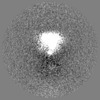[English] 日本語
 Yorodumi
Yorodumi- EMDB-21447: Cryo-EM structure of Arabidopsis thaliana MSL1 in lipid nanodisc -
+ Open data
Open data
- Basic information
Basic information
| Entry | Database: EMDB / ID: EMD-21447 | |||||||||
|---|---|---|---|---|---|---|---|---|---|---|
| Title | Cryo-EM structure of Arabidopsis thaliana MSL1 in lipid nanodisc | |||||||||
 Map data Map data | Arabidopsis thaliana MSL1 in lipid nanodisc | |||||||||
 Sample Sample |
| |||||||||
 Keywords Keywords | ion channel / TRANSPORT PROTEIN | |||||||||
| Function / homology |  Function and homology information Function and homology informationmechanosensitive monoatomic ion channel activity / chloroplast envelope / chloroplast / cellular response to oxidative stress / mitochondrial inner membrane / mitochondrion Similarity search - Function | |||||||||
| Biological species |  | |||||||||
| Method | single particle reconstruction / cryo EM / Resolution: 3.39 Å | |||||||||
 Authors Authors | Deng Z / Zhang J / Yuan P | |||||||||
 Citation Citation |  Journal: Nat Commun / Year: 2020 Journal: Nat Commun / Year: 2020Title: Structural mechanism for gating of a eukaryotic mechanosensitive channel of small conductance. Authors: Zengqin Deng / Grigory Maksaev / Angela M Schlegel / Jingying Zhang / Michael Rau / James A J Fitzpatrick / Elizabeth S Haswell / Peng Yuan /  Abstract: Mechanosensitive ion channels transduce physical force into electrochemical signaling that underlies an array of fundamental physiological processes, including hearing, touch, proprioception, ...Mechanosensitive ion channels transduce physical force into electrochemical signaling that underlies an array of fundamental physiological processes, including hearing, touch, proprioception, osmoregulation, and morphogenesis. The mechanosensitive channels of small conductance (MscS) constitute a remarkably diverse superfamily of channels critical for management of osmotic pressure. Here, we present cryo-electron microscopy structures of a MscS homolog from Arabidopsis thaliana, MSL1, presumably in both the closed and open states. The heptameric MSL1 channel contains an unusual bowl-shaped transmembrane region, which is reminiscent of the evolutionarily and architecturally unrelated mechanosensitive Piezo channels. Upon channel opening, the curved transmembrane domain of MSL1 flattens and expands. Our structures, in combination with functional analyses, delineate a structural mechanism by which mechanosensitive channels open under increased membrane tension. Further, the shared structural feature between unrelated channels suggests the possibility of a unified mechanical gating mechanism stemming from membrane deformation induced by a non-planar transmembrane domain. | |||||||||
| History |
|
- Structure visualization
Structure visualization
| Movie |
 Movie viewer Movie viewer |
|---|---|
| Structure viewer | EM map:  SurfView SurfView Molmil Molmil Jmol/JSmol Jmol/JSmol |
| Supplemental images |
- Downloads & links
Downloads & links
-EMDB archive
| Map data |  emd_21447.map.gz emd_21447.map.gz | 49.5 MB |  EMDB map data format EMDB map data format | |
|---|---|---|---|---|
| Header (meta data) |  emd-21447-v30.xml emd-21447-v30.xml emd-21447.xml emd-21447.xml | 9.9 KB 9.9 KB | Display Display |  EMDB header EMDB header |
| Images |  emd_21447.png emd_21447.png | 125.5 KB | ||
| Filedesc metadata |  emd-21447.cif.gz emd-21447.cif.gz | 5 KB | ||
| Archive directory |  http://ftp.pdbj.org/pub/emdb/structures/EMD-21447 http://ftp.pdbj.org/pub/emdb/structures/EMD-21447 ftp://ftp.pdbj.org/pub/emdb/structures/EMD-21447 ftp://ftp.pdbj.org/pub/emdb/structures/EMD-21447 | HTTPS FTP |
-Validation report
| Summary document |  emd_21447_validation.pdf.gz emd_21447_validation.pdf.gz | 511.8 KB | Display |  EMDB validaton report EMDB validaton report |
|---|---|---|---|---|
| Full document |  emd_21447_full_validation.pdf.gz emd_21447_full_validation.pdf.gz | 511.4 KB | Display | |
| Data in XML |  emd_21447_validation.xml.gz emd_21447_validation.xml.gz | 6.1 KB | Display | |
| Data in CIF |  emd_21447_validation.cif.gz emd_21447_validation.cif.gz | 6.9 KB | Display | |
| Arichive directory |  https://ftp.pdbj.org/pub/emdb/validation_reports/EMD-21447 https://ftp.pdbj.org/pub/emdb/validation_reports/EMD-21447 ftp://ftp.pdbj.org/pub/emdb/validation_reports/EMD-21447 ftp://ftp.pdbj.org/pub/emdb/validation_reports/EMD-21447 | HTTPS FTP |
-Related structure data
| Related structure data |  6vxpMC  6vxmC  6vxnC C: citing same article ( M: atomic model generated by this map |
|---|---|
| Similar structure data |
- Links
Links
| EMDB pages |  EMDB (EBI/PDBe) / EMDB (EBI/PDBe) /  EMDataResource EMDataResource |
|---|---|
| Related items in Molecule of the Month |
- Map
Map
| File |  Download / File: emd_21447.map.gz / Format: CCP4 / Size: 64 MB / Type: IMAGE STORED AS FLOATING POINT NUMBER (4 BYTES) Download / File: emd_21447.map.gz / Format: CCP4 / Size: 64 MB / Type: IMAGE STORED AS FLOATING POINT NUMBER (4 BYTES) | ||||||||||||||||||||||||||||||||||||||||||||||||||||||||||||||||||||
|---|---|---|---|---|---|---|---|---|---|---|---|---|---|---|---|---|---|---|---|---|---|---|---|---|---|---|---|---|---|---|---|---|---|---|---|---|---|---|---|---|---|---|---|---|---|---|---|---|---|---|---|---|---|---|---|---|---|---|---|---|---|---|---|---|---|---|---|---|---|
| Annotation | Arabidopsis thaliana MSL1 in lipid nanodisc | ||||||||||||||||||||||||||||||||||||||||||||||||||||||||||||||||||||
| Projections & slices | Image control
Images are generated by Spider. | ||||||||||||||||||||||||||||||||||||||||||||||||||||||||||||||||||||
| Voxel size | X=Y=Z: 1.1 Å | ||||||||||||||||||||||||||||||||||||||||||||||||||||||||||||||||||||
| Density |
| ||||||||||||||||||||||||||||||||||||||||||||||||||||||||||||||||||||
| Symmetry | Space group: 1 | ||||||||||||||||||||||||||||||||||||||||||||||||||||||||||||||||||||
| Details | EMDB XML:
CCP4 map header:
| ||||||||||||||||||||||||||||||||||||||||||||||||||||||||||||||||||||
-Supplemental data
- Sample components
Sample components
-Entire : MSL1
| Entire | Name: MSL1 |
|---|---|
| Components |
|
-Supramolecule #1: MSL1
| Supramolecule | Name: MSL1 / type: complex / ID: 1 / Parent: 0 / Macromolecule list: all |
|---|---|
| Source (natural) | Organism:  |
-Macromolecule #1: Mechanosensitive ion channel protein 1, mitochondrial
| Macromolecule | Name: Mechanosensitive ion channel protein 1, mitochondrial / type: protein_or_peptide / ID: 1 / Number of copies: 7 / Enantiomer: LEVO |
|---|---|
| Source (natural) | Organism:  |
| Molecular weight | Theoretical: 46.576535 KDa |
| Recombinant expression | Organism:  Komagataella pastoris (fungus) Komagataella pastoris (fungus) |
| Sequence | String: MSSKSDDFGS IVASGVTGSG DGNGNGNDWV EKAKDVLQTS VDAVTETAKK TKDVSDEMIP HVQQFLDSNP YLKDVIVPVS LTMTGTLFA WVVMPRILRR FHTYAMQSSA KLLPVGFSNE DVPYEKSFWG ALEDPARYLV TFIAFAQIAA MVAPTTIAAQ Y FSPTVKGA ...String: MSSKSDDFGS IVASGVTGSG DGNGNGNDWV EKAKDVLQTS VDAVTETAKK TKDVSDEMIP HVQQFLDSNP YLKDVIVPVS LTMTGTLFA WVVMPRILRR FHTYAMQSSA KLLPVGFSNE DVPYEKSFWG ALEDPARYLV TFIAFAQIAA MVAPTTIAAQ Y FSPTVKGA VILSLVWFLY RWKTNVITRM LSAKSFGGLD REKVLTLDKV SSVGLFAIGL MASAEACGVA VQSILTVGGV GG VATAFAA RDILGNVLSG LSMQFSRPFS MGDTIKAGSV EGQVIEMGLT TTSLLNAEKF PVLVPNSLFS SQVIVNKSRA QWR AIASKI PLQIDDLDMI PQISNEIKEM LRSNTKVFLG KEAPHCYLSR VEKSFAELTI GCNLIRMGKE ELYNTQQEVL LEAV KIIKK HGVSLGTTWD NSTLSNSLEV LFQ UniProtKB: Mechanosensitive ion channel protein 1, mitochondrial |
-Experimental details
-Structure determination
| Method | cryo EM |
|---|---|
 Processing Processing | single particle reconstruction |
| Aggregation state | particle |
- Sample preparation
Sample preparation
| Concentration | 1 mg/mL |
|---|---|
| Buffer | pH: 8 |
| Grid | Details: unspecified |
| Vitrification | Cryogen name: ETHANE |
- Electron microscopy
Electron microscopy
| Microscope | FEI TITAN KRIOS |
|---|---|
| Image recording | #0 - Image recording ID: 1 / #0 - Film or detector model: GATAN K2 SUMMIT (4k x 4k) / #0 - Average electron dose: 62.0 e/Å2 / #1 - Image recording ID: 2 / #1 - Film or detector model: GATAN K2 SUMMIT (4k x 4k) / #1 - Average electron dose: 62.0 e/Å2 |
| Electron beam | Acceleration voltage: 300 kV / Electron source:  FIELD EMISSION GUN FIELD EMISSION GUN |
| Electron optics | Illumination mode: OTHER / Imaging mode: OTHER |
| Experimental equipment |  Model: Titan Krios / Image courtesy: FEI Company |
 Movie
Movie Controller
Controller


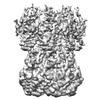


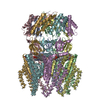
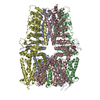
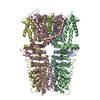
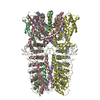




 Z (Sec.)
Z (Sec.) Y (Row.)
Y (Row.) X (Col.)
X (Col.)


















